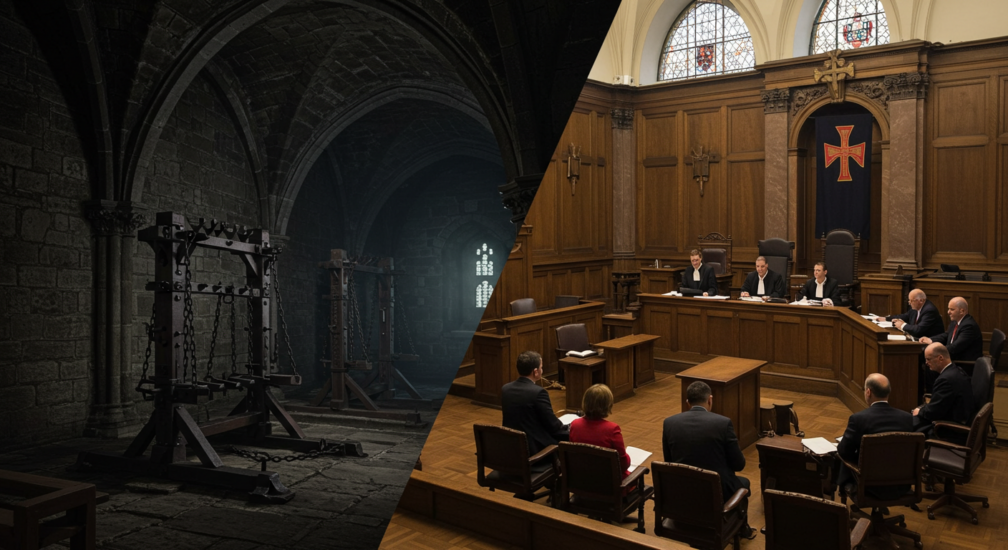Would medieval punishments be effective in today’s legal system? The history of torture is filled with brutal methods used for control, punishment, and extracting confessions. While these techniques were considered standard practice in torture in the middle ages, they raise serious ethical and legal questions today. Could these methods still serve a purpose in modern society, or do they violate fundamental torture and human rights laws?
The Role of Torture in Medieval Justice
Throughout history, societies have relied on torture to maintain justice and social order. The historical use of torture included methods like the rack, iron maiden, and public execution, which were used not only to punish criminals but also to instill fear among the population. However, these methods often led to false confessions due to extreme pain and coercion, bringing into question their effectiveness in achieving true justice.
A visit to the Medieval Torture Museum in Chicago offers a glimpse into the brutal instruments of medieval law enforcement and how they shaped legal systems.
The Psychological Effects of Torture
One of the key arguments against medieval punishments today is their psychological effects. Torture in warfare and state-sanctioned violence have long-term consequences for victims, leading to severe trauma, PTSD, and lasting emotional distress. Modern psychology shows that extreme pain often results in unreliable testimonies, further questioning the validity of using such methods for law enforcement.
Ethical Considerations in Would Medieval Punishments Work Today? A Legal Debate
Introduction
Would medieval punishments be effective in today’s legal system? The history of torture is filled with brutal methods used for control, punishment, and extracting confessions. While these techniques were considered standard practice in torture in the middle ages, they raise serious ethical and legal questions today. Could these methods still serve a purpose in modern society, or do they violate fundamental torture and human rights laws?
The Role of Torture Modern Times
The ethics of torture have been widely debated. While some argue that extreme punishment deters crime, others believe it contradicts modern principles of morality and human dignity. The moral implications of torture suggest that societies should focus on reform rather than inflicting pain. Would a return to medieval punishments align with today’s principles of rehabilitation, or would it simply be an act of retribution?
To explore more about ethical dilemmas related to historical punishment methods, visit the Medieval Torture Museum in LA, which provides thought-provoking exhibits on medieval and modern torture practices.
Legal Perspectives: Can Medieval Punishments Be Justified Today?
Modern legal systems are bound by international laws against torture, which prohibit cruel and inhumane treatment. The Geneva Conventions and human rights organizations advocate for humane treatment, emphasizing that torture in modern times has no place in a civilized society. The discussion about reinstating such punishments contradicts established human rights frameworks and could be seen as a return to oppression rather than justice.
Historical Lessons: Why Society Moved Away from Medieval Justice
The transition from torture in the middle ages to modern legal systems demonstrates a shift in values. While the past relied on power and control, today’s laws focus on fairness and guilt being proven through due process rather than forced confessions. Understanding this evolution is crucial in ensuring history does not repeat itself.
Those interested in the evolution of medieval punishment and its societal impact can explore the Medieval Torture Museum in St Augustine, which presents detailed historical accounts of torture devices and their role in shaping justice systems.
Conclusion: Are Medieval Punishments Relevant Today?
While medieval punishments may appear as a quick solution for crime control, their moral implications and legal limitations outweigh any perceived benefits. The discussion on whether these brutal methods could work today highlights the importance of legal ethics, human rights, and psychological well-being.
For further discussions on historical justice, punishment methods, and ethical debates, visit our blog, where we explore the past to understand the present.
Ultimately, the legal and ethical frameworks of the modern world have moved beyond torture and human rights violations, favoring justice systems based on fairness, dignity, and respect for human life. Although medieval punishments serve as a reminder of the brutality of the past, they have no place in a society that values rehabilitation and human dignity.





